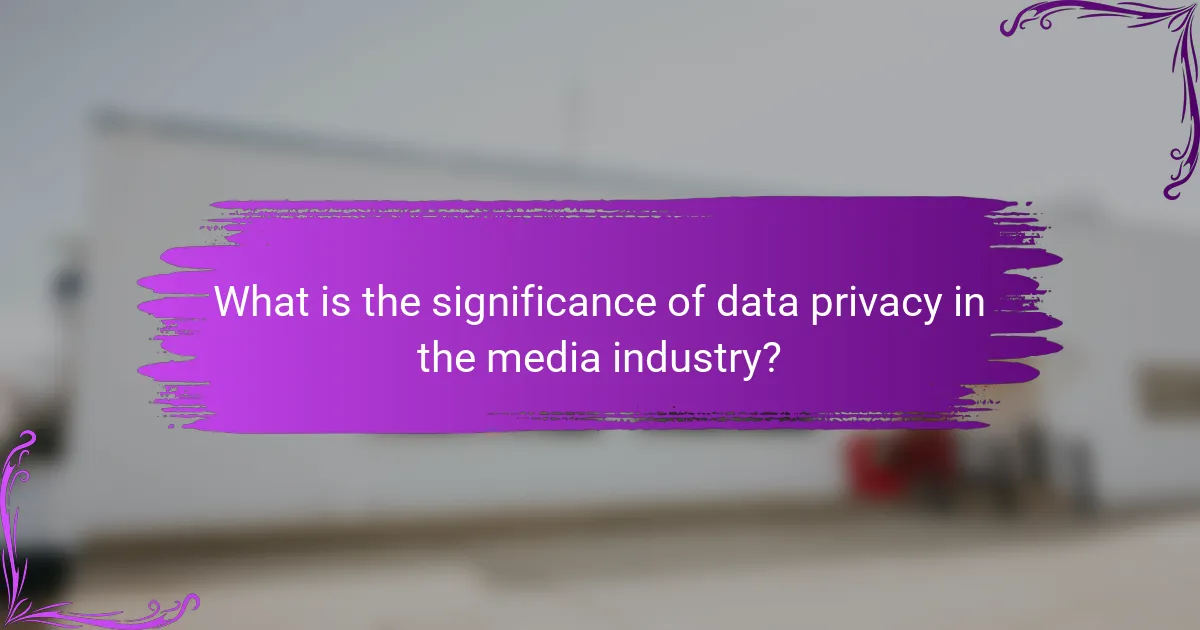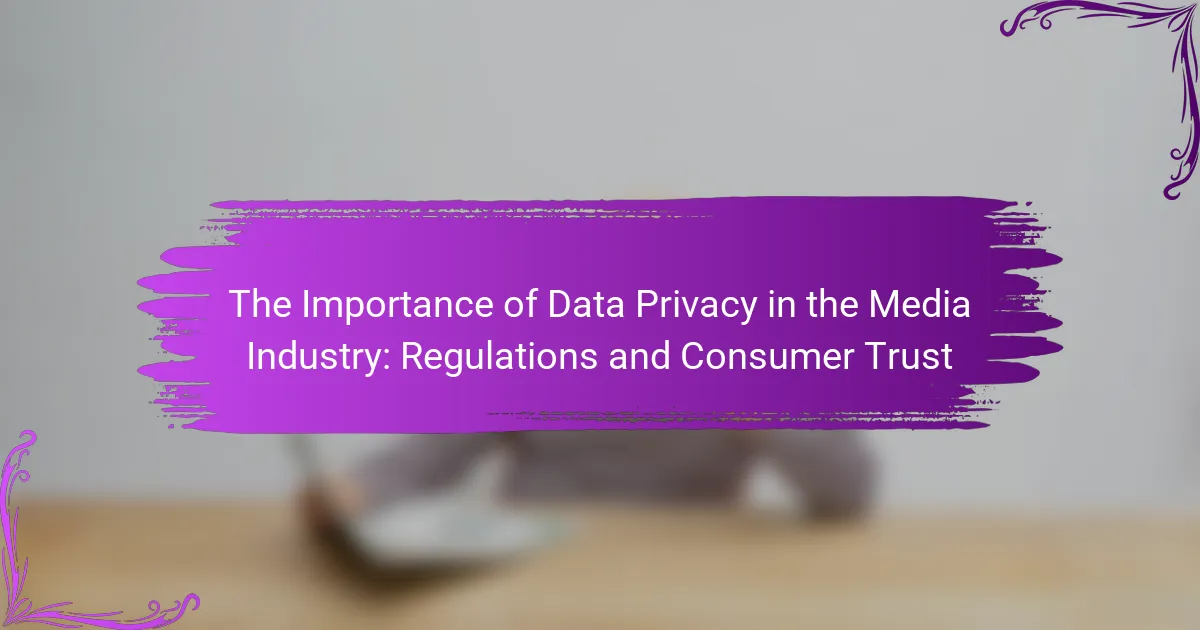
What is the significance of data privacy in the media industry?
Data privacy is crucial in the media industry to protect consumer information. It ensures that personal data is handled responsibly and securely. Violations can lead to significant legal consequences and damage to reputation. According to the GDPR, companies can face fines up to 4% of annual global revenue for non-compliance. Trust is essential for media companies to maintain audience loyalty. When consumers feel their data is secure, they are more likely to engage with content. Data breaches can result in loss of audience and revenue. Thus, data privacy safeguards both consumers and media organizations.
How does data privacy impact consumer trust in the media?
Data privacy significantly impacts consumer trust in the media. When consumers feel their personal information is protected, they are more likely to engage with media outlets. A survey by the Pew Research Center found that 79% of Americans are concerned about how their data is being used. This concern can lead to skepticism towards media organizations that do not prioritize data protection. Consumers tend to favor media that transparently communicates its data practices. A lack of trust may result in reduced audience engagement and loyalty. Therefore, strong data privacy measures can enhance consumer confidence in media organizations.
What are the key factors influencing consumer perceptions of data privacy?
Key factors influencing consumer perceptions of data privacy include trust, transparency, and control. Trust in organizations affects how consumers view their data handling. Transparency about data practices builds consumer confidence. Control over personal data empowers consumers to feel secure. Additionally, past data breaches impact consumer perceptions negatively. Regulatory compliance also shapes consumer expectations regarding data privacy. Studies show that consumers prefer companies that prioritize data protection. For example, a 2021 survey by the Pew Research Center found that 79% of Americans are concerned about how their data is used.
How do data breaches affect consumer trust levels?
Data breaches significantly diminish consumer trust levels. When personal information is compromised, consumers feel vulnerable. A study by the Ponemon Institute found that 75% of consumers would stop purchasing from a brand after a data breach. Trust is built on the expectation of security. Breaches violate this expectation, leading to skepticism. Companies experience a decline in customer loyalty post-breach. A survey by IBM revealed that 60% of consumers would switch brands following a breach. Thus, data breaches create a lasting impact on consumer trust.
Why are regulations important for data privacy in the media industry?
Regulations are crucial for data privacy in the media industry to protect consumer information. They establish legal frameworks that govern how data is collected, stored, and used. Compliance with regulations helps prevent data breaches and unauthorized access. For example, the General Data Protection Regulation (GDPR) imposes strict guidelines on data handling. This regulation has led to increased transparency and accountability among media companies. Additionally, regulations build consumer trust by ensuring their data is managed responsibly. Trust is essential for maintaining audience engagement and loyalty in the media sector. Overall, regulations safeguard personal data and promote ethical practices in the industry.
What are the main regulatory frameworks governing data privacy?
The main regulatory frameworks governing data privacy include the General Data Protection Regulation (GDPR), the California Consumer Privacy Act (CCPA), and the Health Insurance Portability and Accountability Act (HIPAA). The GDPR, enacted in 2018, sets strict guidelines for data collection and processing in the European Union. It emphasizes user consent and data protection rights. The CCPA, effective from 2020, grants California residents rights over their personal information, including access and deletion rights. HIPAA, established in 1996, protects sensitive patient health information in the U.S. healthcare sector. These frameworks collectively shape data privacy practices across various industries.
How do these regulations vary across different regions?
Data privacy regulations vary significantly across different regions. In the European Union, the General Data Protection Regulation (GDPR) enforces strict data protection standards. It mandates explicit consent for data processing and grants consumers extensive rights over their data. In contrast, the United States employs a more fragmented approach. Laws like the California Consumer Privacy Act (CCPA) provide some protections but vary by state. In Asia, countries like Japan have their own regulations, such as the Act on the Protection of Personal Information (APPI), which emphasizes data security and consumer rights. Each region’s regulations reflect cultural attitudes toward privacy and data protection. For example, European regulations prioritize individual privacy, while U.S. laws often prioritize business interests.

What are the challenges media companies face regarding data privacy?
Media companies face significant challenges regarding data privacy. One major challenge is compliance with regulations like GDPR and CCPA. These laws impose strict requirements on data collection and user consent. Violating these regulations can lead to hefty fines. Another challenge is maintaining consumer trust. Consumers are increasingly concerned about how their data is used. Media companies must balance personalization with privacy to retain audience loyalty. Additionally, data breaches pose a constant threat. High-profile breaches have damaged reputations and eroded trust. Lastly, technological advancements complicate data management. Rapidly evolving tools can make it difficult to ensure data security. These challenges require ongoing attention and adaptation from media companies.
How do technological advancements complicate data privacy?
Technological advancements complicate data privacy by increasing the volume and variety of data collected. Advanced technologies like artificial intelligence and big data analytics enable organizations to gather vast amounts of personal information. This data can include sensitive details such as location, preferences, and online behavior. The rise of the Internet of Things (IoT) further exacerbates this issue, as everyday devices continuously collect and transmit data.
Additionally, the rapid development of cloud computing creates challenges in data storage and access control. Data breaches have become more common, with a report from IBM indicating that the average cost of a data breach reached $4.24 million in 2021. Furthermore, the lack of standardized regulations across different jurisdictions complicates compliance for organizations. As a result, individuals often have limited control over their personal data, leading to increased risks of misuse and exploitation.
What role does artificial intelligence play in data privacy concerns?
Artificial intelligence significantly impacts data privacy concerns. AI systems analyze vast amounts of personal data. This raises risks of unauthorized access and misuse. According to a 2021 report by the International Association of Privacy Professionals, 79% of consumers express concern about AI’s impact on their privacy. AI can also enable surveillance and profiling, further complicating privacy issues. Moreover, algorithms may inadvertently reinforce biases, leading to discriminatory practices. The increasing reliance on AI in data processing necessitates robust privacy regulations. Effective governance can help mitigate these risks and protect consumer trust in the media industry.
How can media companies balance innovation with privacy protection?
Media companies can balance innovation with privacy protection by implementing robust data governance frameworks. These frameworks should prioritize user consent and transparency in data collection practices. For instance, adhering to regulations like GDPR ensures that user data is handled responsibly. Companies can also invest in privacy-enhancing technologies, such as data anonymization and encryption. This allows for innovative services while safeguarding personal information. Regular audits and assessments of data practices can help identify potential privacy risks. Engaging with consumers about their privacy preferences fosters trust and enhances brand loyalty. By integrating these strategies, media companies can innovate without compromising user privacy.
What are the consequences of non-compliance with data privacy regulations?
Non-compliance with data privacy regulations can lead to significant legal and financial consequences. Organizations may face hefty fines, which can reach millions of dollars depending on the severity of the violation. For instance, the General Data Protection Regulation (GDPR) allows fines of up to 4% of annual global revenue. Non-compliance can also result in legal actions from consumers or regulatory bodies. Additionally, businesses may suffer reputational damage, leading to loss of customer trust and loyalty. A survey by IBM found that 75% of consumers would stop purchasing from a company that experienced a data breach. Ultimately, non-compliance can hinder an organization’s ability to operate effectively in the market.
What penalties do media companies face for data privacy violations?
Media companies face significant penalties for data privacy violations. These penalties can include hefty fines imposed by regulatory authorities. For example, the General Data Protection Regulation (GDPR) allows fines up to €20 million or 4% of annual global revenue, whichever is greater. Additionally, companies may face legal actions from affected consumers. Lawsuits can result in costly settlements or damages. Regulatory bodies may also impose restrictions on data processing activities. This can severely impact a company’s operations and reputation. Such penalties emphasize the importance of compliance with data privacy laws.
How can non-compliance affect a company’s reputation?
Non-compliance can severely damage a company’s reputation. It leads to loss of consumer trust and credibility. Customers expect companies to adhere to data privacy regulations. When companies fail to comply, they risk public backlash. Negative media coverage often follows compliance failures. This can result in decreased customer loyalty. Studies show that 75% of consumers avoid businesses with poor compliance records. Additionally, regulatory fines can further tarnish a company’s image. Overall, non-compliance creates long-term reputational harm.

What best practices can media companies adopt for data privacy?
Media companies can adopt several best practices for data privacy. First, they should implement data encryption to protect sensitive information. Encryption makes data unreadable to unauthorized users. Second, they must establish clear data retention policies. These policies dictate how long data is stored and when it is deleted. Third, companies should conduct regular security audits. Audits help identify vulnerabilities in data protection measures. Fourth, training employees on data privacy is essential. Well-informed staff can better recognize and prevent data breaches. Fifth, obtaining explicit consent from users is crucial. Consent ensures transparency in how data is collected and used. Lastly, companies should comply with relevant data protection regulations. Compliance with laws like GDPR fosters consumer trust and accountability.
How can media organizations enhance consumer trust through transparency?
Media organizations can enhance consumer trust through transparency by openly sharing their data collection practices. Clear communication about how consumer data is used fosters trust. Providing accessible privacy policies helps consumers understand their rights. Regular updates on data handling practices reinforce accountability. Transparency in editorial processes can also build credibility. Engaging with consumers about their concerns shows responsiveness. Data protection certifications can further validate commitment to privacy. Research indicates that transparency directly correlates with increased consumer trust in media entities.
What information should media companies disclose to consumers?
Media companies should disclose information regarding data collection practices. This includes what data is collected and how it is used. They must inform consumers about third-party sharing of their data. Transparency about data retention periods is also essential. Consumers should know their rights regarding data access and deletion. Media companies need to disclose any security measures in place to protect data. Additionally, they should inform users about any changes to privacy policies. Compliance with relevant regulations, such as GDPR, is necessary for consumer trust.
How can effective communication strategies improve consumer trust?
Effective communication strategies can significantly improve consumer trust by fostering transparency and clarity. Clear messaging helps consumers understand how their data is used. This understanding reduces anxiety about data privacy. Consistent communication builds reliability in a brand’s promises. Brands that engage in two-way communication show they value consumer feedback. This engagement creates a sense of partnership between the brand and its consumers. According to a 2020 study by Edelman, 81% of consumers stated that they need to trust a brand to buy from them. Thus, effective communication directly correlates with increased consumer trust.
What tools and technologies can help ensure data privacy?
Encryption software ensures data privacy by converting information into a secure format. It protects sensitive data during transmission and storage. Examples include AES (Advanced Encryption Standard) and RSA (Rivest-Shamir-Adleman). VPNs (Virtual Private Networks) enhance privacy by masking IP addresses. They create secure connections over the internet. Firewalls monitor incoming and outgoing network traffic. They prevent unauthorized access to data. Data loss prevention (DLP) tools protect sensitive information from being shared outside the organization. Identity and access management (IAM) systems control user access to data. They ensure only authorized individuals can access sensitive information. Regular software updates patch vulnerabilities, reducing the risk of data breaches.
Which software solutions are most effective for data protection?
The most effective software solutions for data protection include encryption software, data loss prevention (DLP) tools, and secure backup solutions. Encryption software, like VeraCrypt, secures data by converting it into an unreadable format. DLP tools, such as Symantec DLP, monitor and control data transfers to prevent unauthorized access. Secure backup solutions, like Acronis Backup, ensure data recovery in case of loss or breach. These solutions are validated by their widespread use in industries requiring stringent data protection measures. For instance, a 2021 report by Cybersecurity Insiders found that 93% of organizations use encryption to protect sensitive data.
How can media companies implement robust data security measures?
Media companies can implement robust data security measures by adopting a multi-layered security approach. This includes using encryption to protect sensitive data both at rest and in transit. Regular security audits can identify vulnerabilities and ensure compliance with regulations. Employee training on data privacy best practices is essential to mitigate human error. Implementing access controls restricts data access to authorized personnel only. Utilizing firewalls and intrusion detection systems can prevent unauthorized access. Regularly updating software and systems protects against known vulnerabilities. Finally, developing an incident response plan prepares companies to address potential data breaches effectively. These measures collectively enhance data security and build consumer trust in the media industry.
What steps can consumers take to protect their data in the media industry?
Consumers can protect their data in the media industry by using strong, unique passwords for their accounts. Regularly updating these passwords adds an extra layer of security. Enabling two-factor authentication can further safeguard accounts from unauthorized access. Consumers should also be cautious about sharing personal information online. Reviewing privacy settings on media platforms helps control what data is shared. Utilizing VPNs can encrypt internet traffic, enhancing privacy while browsing. Staying informed about data breaches allows consumers to take timely action. Lastly, reading privacy policies helps consumers understand how their data is used and stored.
The primary entity of this article is data privacy within the media industry, which plays a vital role in safeguarding consumer information and maintaining trust. The article examines the significance of data privacy, the impact of regulations like GDPR and CCPA, and the challenges media companies face in ensuring compliance and protecting consumer data. It also highlights the factors influencing consumer perceptions of data privacy, the consequences of non-compliance, and best practices for enhancing data security. Additionally, the article outlines the importance of transparency and effective communication strategies in building consumer trust in media organizations.



